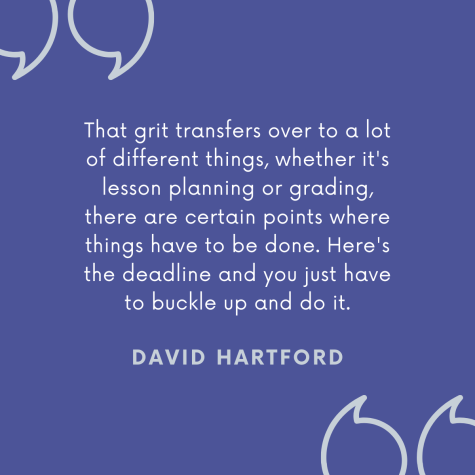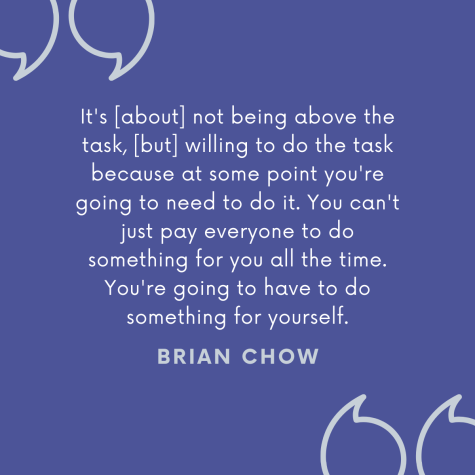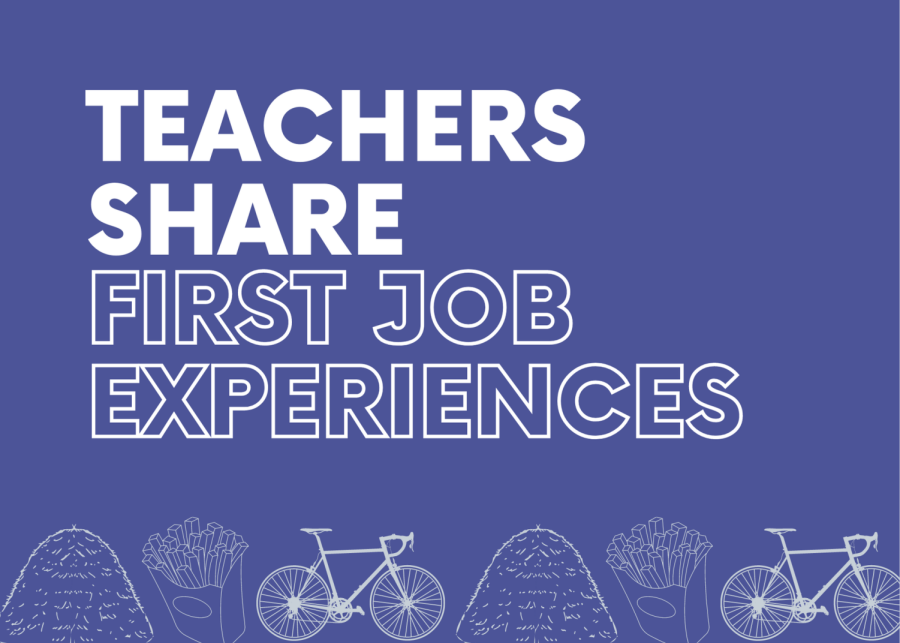Teachers share first job experiences
Looking back on staff members’ formative years
March 18, 2022
David Hartford
Social Studies teacher David Hartford grew up helping on his family’s farm in Michigan from age 5. By 13, he earned $7 per hour, which he says was a “decent amount” at the time, considering the minimum wage in Michigan had not hit $7 yet.
During Hartford’s summers, he would toss hay bales — which typically weigh 60 to 70 pounds — 10 feet into the air, which he describes as a “lot of work.” Hartford recalls working through harsh 90-degree temperatures, 70% humidity and rain while also managing deadlines that were often “unpredictable.” However, looking back, he reflects that the obstacles he faced helped him develop determination and adaptability.
“That grit transfers over to a lot of different things, whether it’s lesson planning or grading, there are certain points where things have to be done,” Hartford said. “Here’s the deadline and you just have to buckle up and do it.”
By the time Hartford was a senior in high school, he began looking forward to his work and felt a sense of fulfillment after each day knowing he had accomplished something. In Michigan, he could get his driver’s license at 15 because he worked on the farm, so his first driving experience was on the farm.

“That was that one experience where I’m just like, ‘maybe this isn’t the job for me, but at the end of the day, it was a fun experience [and] I enjoyed it,” Hartford said.
Overall, Hartford recognizes that while some students may prefer other extracurricular activities, working at a job could be a valuable experience because it would teach them to manage an independent source of income without relying on their parents.
“There’s a real sense of independence where you’re doing something on your own,” Hartford said. “You don’t need help from your parents for certain things, like when I bought my first phone or when I bought my first car and things like that. That makes it easier when you get into the real world and have to take that step for independence.”
Brian Chow
At 10 years old, art teacher Brain Chow was looking to earn money, so he asked neighbors if they had anything they needed help with. One of his neighbors, a real estate agent, asked him to deliver advertising flyers around the neighborhood for a penny per flier. Six years later, Chow saw a McDonald’s ad in a newspaper and set up an appointment for an interview.
On his first day working at McDonald’s, Chow shadowed the other employees as they taught him what he was supposed to do. Soon, he became familiar with the kitchen, how to use the register and the general procedures required of employees.
Through this job, Chow got to learn how challenging it was to work with people in the food service industry. Since customers are “often not very polite to workers, and service workers in particular,” he sometimes found it difficult to remain patient and learn that their complaints weren’t personal.
“Someone might be mad at you but they don’t know who you are,” Chow said. “They’re just mad at the situation and you happen to be the person in front of them. So the question is, what are you going to do to help them move along?”
In addition, Chow learned how to work with other employees as a team. If someone didn’t do their job in the time frame they were supposed to, it made the food assembly process more difficult and time-consuming.
After adjusting to the learning curve at McDonald’s, Chow concluded that employees working in food service establishments are often very efficient and well trained, and the job teaches a lot about how to accomplish tasks effectively from a business perspective. Additionally, in food service, employees learn to meet customers’ needs and gain experience in directly “dealing with people and not things.” Overall, Chow says that the experience was humbling and enabled him to have honest interactions with others.

“Everyone should be able to get their hands dirty and not even think twice about it — that’s what happens, and you just clean your hands up and you’re good,” Chow said. “It’s [about] not being above the task, [but] willing to do the task because at some point you’re going to need to do it. You can’t just pay everyone to do something for you all the time. You’re going to have to do something for yourself.”
As someone who worked a variety of jobs throughout his youth, Chow recommends that every student gets a job before they leave high school.
“As you enter adulthood, having experiences that are your own is important [and] the more you do as a teenager, the better off you’re going to be [as an adult], [because], whatever experiences [you have], they’re your own,” Chow said. “If your parents are in charge of what you do, or if they’re opening the doors for you or creating opportunities for you, that’s great [that] you’re getting some experience that way. But if you’re the person that tracked down that internship, I would say then that’s the type of experience on your own.”
Within the MVHS community, there are a lot of what Chow describes as “helicopter parents,” “snowplow parents” or “bulldozer parents” — parents who actively try to make their children’s lives easier by getting rid of any obstacles they may encounter. Chow, however, believes that students shouldn’t be afraid to work in a field like food service.
“Getting experiences independent of the adults in your life that have helped pave the road for you is a good thing,” Chow said. “Go pave your own road. Go get lost on your own trail. Go find your own experiences — wander, discover, explore, get curious about something and then go pursue it and find interest in it, whatever that might be.”
Molly Guadiamos
Spanish teacher Molly Guadiamos was 12 or 13 years old when she worked her first job distributing newspapers for the Mercury News after her friend told her about a route “that needed to be picked up.” As a paper delivery girl, Guadiamos first packaged newspapers with rubber bands, and then biked around the neighborhood, throwing the papers “like a frisbee” to houses so she didn’t have to stop on her bike.
When she first started the job, Guadiamos remembers struggling to navigate the neighborhood area and knowing which houses and apartments she needed to deliver the newspapers to. Furthermore, the stacks of newspapers were heavy, particularly on Sundays when she had to deliver twice the amount, which made the job physically demanding because she had to balance on the bike while throwing the newspapers accurately to homes. She says the experience taught her about organization and how to manage her money responsibly.

“When you collect money you can’t just go out and spend it because you got to pay your bill every month to the Mercury News for the papers,” Guadiamos said. “So it taught a lot of responsibility and dealing with people, dealing with adults, so I think all of that is good on any job, being responsible and consistent and all of that.”
Now, Guadiamos has begun to notice that across all of her classes, very few students have part-time jobs, and thinks that it’s “unfortunate” because they could “learn a lot from having a job.”
“[They learn about the] value of money, like how long it takes for you to work [and] get that much money and they make better decisions about spending because they know how much work it takes,” Guadiamos said. “High schoolers should get a job. I think that would be much more valuable than going to one of those science camps in the summer.”


















